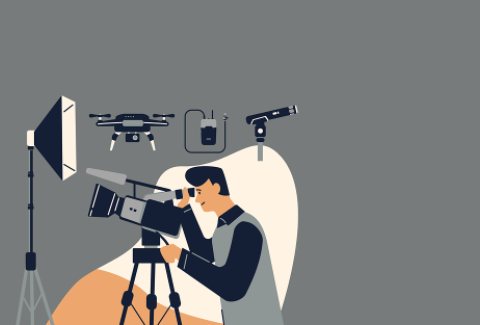If great novels are an extraordinary collection of sentences, then it means good films are a perfect collection of shots. No one understands this better than a cinematographer. To most film buffs, cinematographers are the second most important individuals on the set, after directors. However, how many of you know the skills that a cinematographer requires? So whether you want to be a cinematographer or hire one for your upcoming film, the following are skills to look at:
1. Flexible Creativity
It is not possible to make a film without creativity. Plus, you can’t say you are a creative filmmaker when you have not invested much of your time to understand filmmaking specialties.
As a cinematographer, you require creative talent so as to visualise film production. From the onset to the end, Mark Murphy Director, says that filmmaking needs visions from everyone involved in the production process.
2. Personality
Like professional cinematographers, you must have confidence in your experience with the capability to handle challenges. You must be self-reliant and strong to deal with variable and, at times, stressful job situations. Plus, you must be pragmatic when it comes to problem-solving.
Your working time may also vary from dealing with a big team of other creatives to working on a location as the ‘one-man-band.’ That means you may spend some time working alone at a computer when conducting all housekeeping tasks and editing.
3. Technical Skills
It is not a must if you have access to an expensive film college or Hollywood movie set so as to practice cinematography craft. As a cinematographer, you should be fluent in manipulating shadow, light, and colour. You must also be conversant with all the pieces of equipment needed to do so. In order to light a scene, you need a camera with an external LED video light. This type of light provides more control over the color temperature and intensity in comparison to other types of lights. Practice the shooting at varying times of the day to determine the way it impacts your image. Remember also to read articles or listen to podcasts with every cinematographer you trust. This is a perfect way to hone your cinematography skills.
4. Sound Recording and Editing
Regardless of modern technology with inbuilt microphones recording everything, you won’t be sure about an audio syncing problem along the way. Sound management of recorded media normally slows down the entire filmmaking stage. The detailed sound mix is also as good as pictures appearing on the screen. In general, most cinematographers are misguided by the concept of audio quality being a movie’s feature. What most don’t know is that minimising the background noise, adapting an edited recording, and adding smooth sound are the keystones when it comes to film production.
5. Communication Skills
From interviews and meetings to emails, there are many situations in the world of creativity where it will pay to have great communication skills. Effective communication includes digital, written, non-verbal, and verbal. It is also equally vital to be a great listener and develop a strong working relationship dynamically with your boss.
Closing Remarks!
Cinematographers are responsible for turning the creative visions of a director into the production-feasible reality on the screen. Like most other good jobs, many individuals don’t make it. Just bear this in your mind, though don’t get despondent.











